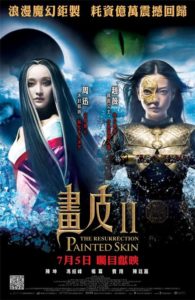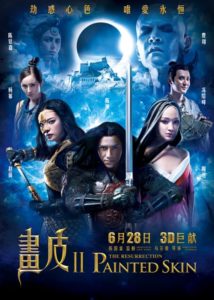Painted Skin: The Resurrection
画皮II
China/Hong Kong, 2012, colour, 2.35:1, 3-D (China only), 130 mins.
Director: Wuershan 乌尔善.
Rating: 8/10.
Slick fantasy vehicle for three Mainland stars is in a different league to the 2008 film.
Ancient China. Fox demon Xiaowei (Zhou Xun), imprisoned in ice 500 years ago for breaking the rule of saving a human’s life, is released by bird demon Que’er (Yang Mi), who becomes her disciple and is inculcated by Xiaowei’s philosophy that men are only attracted by external beauty. Disappointed in love, and constantly threatened by the Big Freeze that tries to engulf her, Xiaowei needs a regular supply of men’s hearts to survive and maintain her beauty. She is still searching for the man who will give his heart up willingly so she can transform herself into a human. On their travels the women extract the heart of a young lecher (Lin Junxiao) but it proves useless. A month  later, Xiaowei is rescued by a masked warrior on horseback who turns out to be Jing (Zhao Wei), a runaway princess-cum-general who is the only unmarried one of the king’s 14 daughters. The warmth of Jing’s heart saves Xiaowei and she accompanies the princess to White City, a border town next to the rival, non-Han kingdom of Tianlang. Jing is searching for Huo Xin (Chen Kun), a general who was once her personal bodyguard and whom she secretly loved. He, however, left his post and went to White City after failing to protect her eight years ago from an attack by a giant bear that left the young princess with a heavily scarred face. When Jing meets Huo Xin again, he is still covered in shame. To Jing’s annoyance, Xiaowei tries to seduce Huo Xin and win his heart, and Jing subsequently discovers that Xiaowei is a demon in disguise. To prove her theory that men are only attracted by external beauty, Xiaowei convinces Jing to let her swap their outer skins and see if Jing can win Huo Xin’s heart that way. But she has only 12 hours before the disguise will shatter. Meanwhile, Que’er has formed a friendship with street quack-cum-demon hunter Pang (Feng Shaofeng), and the queen of Tianlang (Chen Tingjia), abetted by her wizard (Fei Xiang), is threatening to attack White City because of Jing’s refusal to honour an arranged marriage to the queen’s younger brother.
later, Xiaowei is rescued by a masked warrior on horseback who turns out to be Jing (Zhao Wei), a runaway princess-cum-general who is the only unmarried one of the king’s 14 daughters. The warmth of Jing’s heart saves Xiaowei and she accompanies the princess to White City, a border town next to the rival, non-Han kingdom of Tianlang. Jing is searching for Huo Xin (Chen Kun), a general who was once her personal bodyguard and whom she secretly loved. He, however, left his post and went to White City after failing to protect her eight years ago from an attack by a giant bear that left the young princess with a heavily scarred face. When Jing meets Huo Xin again, he is still covered in shame. To Jing’s annoyance, Xiaowei tries to seduce Huo Xin and win his heart, and Jing subsequently discovers that Xiaowei is a demon in disguise. To prove her theory that men are only attracted by external beauty, Xiaowei convinces Jing to let her swap their outer skins and see if Jing can win Huo Xin’s heart that way. But she has only 12 hours before the disguise will shatter. Meanwhile, Que’er has formed a friendship with street quack-cum-demon hunter Pang (Feng Shaofeng), and the queen of Tianlang (Chen Tingjia), abetted by her wizard (Fei Xiang), is threatening to attack White City because of Jing’s refusal to honour an arranged marriage to the queen’s younger brother.
REVIEW
Though the Chinese title bills it as a sequel to Painted Skin 画皮 (2008), Painted Skin: The Resurrection 画皮II has little in common with the lively but hopelessly confused earlier movie directed by Hong Kong’s Chen Jiashang 陈嘉上 [Gordon Chan], Qian Yongqiang 钱永强 [Andy Chin] and Gao Linbao 高林豹. Entirely funded this time round by Mainland companies, it brings back actress Zhou Xun 周迅 as the female fox demon who feeds off men’s hearts but constructs an otherwise unlinked story set in a timeless Ancient China. Also returning are fellow Mainland stars Zhao Wei 赵薇 and Chen Kun 陈坤, but in completely different roles. The result is a very entertaining, slightly over-long costume fantasy whose performances and sheer technique carry a script that often punches above its weight.
Whereas the rather old-fashioned Painted Skin, a Hong Kong-China-Singapore co-production, never knew exactly what it was, and even tried to shoehorn action star Zhen Zidan 甄子丹 [Donnie Yen] into the mix, Resurrection knows exactly what it is. With a hefty RMB150 million budget, excellent and smoothly integrated visual effects by Mainland and South Korean companies, and handsome production values, this is a prestige China production to the hilt – and in a 3-D version as well. At the directing reins is Inner Mongolian-born Wuershan 乌尔善, hot from The Butcher, the Chef and the Swordsman 刀见笑 (2010); and getting equal (if not bigger) display on the posters is Huayi Brothers’ in-house star producer Chen Guofu 陈国富 (The Message 风声, 2009), a Taiwan-born critic-turned-director.
The script by Ran Jia’nan 冉甲男 and Ran Ping 冉平 (The Painter 吴道子, 2012) has no connection with the famous Qing dynasty short story by Pu Songling 蒲松龄 that spawned Painted Skin. Instead, it takes its underlying theme – that beauty is only skin deep – and constructs an elaborate tale in which a seductive fox demon offers to switch her looks with a scarred princess so the latter can test the love of a general who was once her bodyguard. It’s a complex, multi-layered screenplay that mixes myth and witchcraft with eternal truths about love and attraction, as well as stirring in strong “sisterly” resonances in a story that’s female-focused throughout.
The men, represented by star pin-up Chen essaying a macho role and the lesser-known Feng Shaofeng 冯绍峰 (White Vengeance 鸿门宴, 2011) as a comic quack-cum-demon hunter, are basically bystanders to the action. It’s the women who are in the driving seat, led by Zhou’s vampy fox demon, partnered by Zhao’s straight-up female warrior, and supported by fast-rising Mainland name Yang Mi 杨幂 (Mysterious Island 孤岛惊魂, 2011; Love in the Buff 春娇与志明, 2012) as a high-spirited bird demon. Zhou, who since Suzhou River 苏州河 (1999) has almost owned the Mainland patent on sexually ambiguous, seductive roles, dominates the movie as a demon who wants to be human even if it means pain. But she gets a run for her money from Zhao, who’s developing much more screen gravitas in her mid-30s and is better directed here than in her previous female-warrior role in Mulan 花木兰 (2009). Zhao’s scenes with Zhou are much more emotionally resonant than those with the weak-eyed Chen, her putative romantic partner.
Though the film still has flashes of the earthiness that director Wuershan brought to Butcher, Resurrection is a much slicker, more highly varnished production. Despite the flashy action sequences (all whip pans and slo-mo), Wuershan also knows when to go easy on the visual effects and let his actors have some space, as well as marbling in comic interludes (largely in the lively partnership between Yang’s bird demon and Feng’s demon hunter) to ease the burden on the serious stuff. If the central theme of true love vs physical attraction is often overwhelmed by too much plot and detail, the movie is still engrossing when it works and much more emotionally engaging than other blockbusters of its ilk.
The film screened in a 2-D version at its world premiere at the Shanghai Film Festival.
CREDITS
Presented by Ningxia Film Group (CN), Ding Longda (Beijing) International Culture Media (CN), Huayi Brothers Media (CN), Kylin Network (Beijing) Movie & Culture Media (CN). Produced by Ningxia Film Group (CN), Ding Longda (Beijing) International Culture Media (CN), Huayi Brothers Media (CN), Kylin Network (Beijing) Movie & Culture Media (CN), Huayi Brothers International (HK).
Script: Ran Jia’nan, Ran Ping. Story consultation: Ruan Shisheng [James Yuan], Wang Huan, Qian Mi. Photography: Huang Yuetai [Arthur Wong]. Editing: Xiao Yang. Editing consultation: Cheng Xiaoze. Music: Ishida Katsunori. Production design: Hao Yi. Styling: Hao Yi. Costume design: Liu Qian. Concept design: Amano Yoshitaka. Sound: Yang Jiang, Zhao Nan, Wang Gang. Action: Dong Wei. Action choreography: Li Cai. Visual effects: Chang Hongsong (Beijing Miracle Films, CJ Powercast, Kylin Film, Next Visual Studio). Special effects: Xu An [Koan Hui], Zhang Long. Creature design/special make-up: Xiao Jin. Choreography: Wu Weifeng. 3-D producers: Blues Li, Sean Shen. Executive direction: Zhang Changzheng, Zhang Lidong.
Cast: Zhao Wei (Jing, princess), Zhou Xun (Xiaowei), Chen Kun (Huo Xin, general), Yang Mi (Que’er), Feng Shaofeng (Pang, exorcist), Fei Xiang [Kris Phillips] (Tianlang wizard), Chen Tingjia (Tianlang queen), Lu Nuo (Tianlang king), Liu Jiahui [Gordon Liu] (Uncle Da), Zhang Yilong (Leopard), Guan Xiaotong (young Jing), Qin Junjue (young Huo Xin), You Benchang (alchemist), Lin Junxiao (Tianlang prince).
Premiere: Shanghai Film Festival (Opening Film), 16 Jun 2012.
Release: China, 28 Jun 2012; Hong Kong, 5 Jul 2012.
(Review originally published on Film Business Asia, 17 Jun 2012.)
